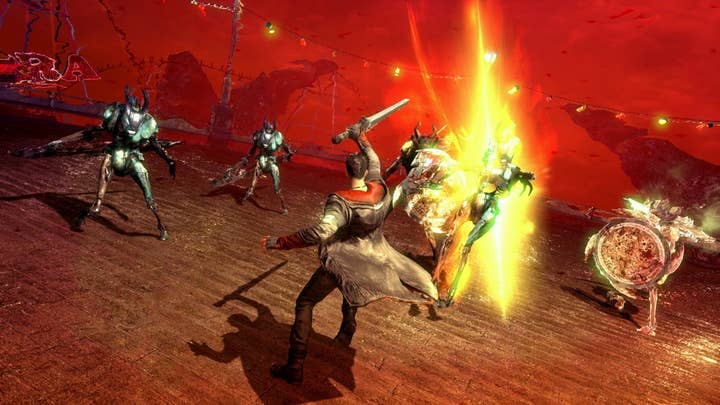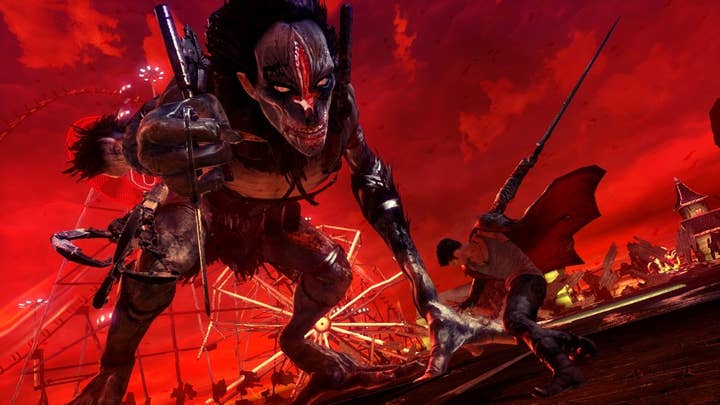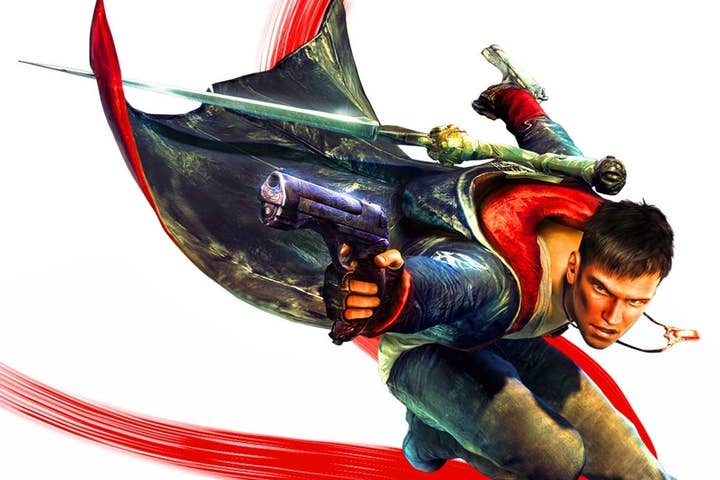Critical Consensus: DmC: Devil May Cry
Ninja Theory takes on Capcom's storied franchise - and wins
Nostalgia is the AAA console developer's closest ally and fiercest enemy. When failure means the loss of millions of dollars and redundancies by the dozen, a recognised and revered brand can be a helpful short-cut to finding a large enough audience. But that very reverence is primed to backfire, exploding in a cacophonous din of inconsistent criticism tainted by the press and public's personal recollections.
Ninja Theory learned this the hard way when it unveiled its take on Devil May Cry. Where was the series' characteristic humour and sense of the absurd? Why did Dante look like a My Chemical Romance reject? Why had the title been reduced to a stylised acronym? In the time it took to watch a two-minute trailer, the game's target audience had decided that DmC wasn't what they were looking for, even if they didn't necessarily know what that was in the first place.
"With attitude in spades and a clutch of killer lines, there have been few better reinventions of a classic character than this"
Rich Stanton, Eurogamer
According to the Daily Telegraph's Ashton Raze these early criticisms were all smoke and no fire. In a glowing five-star review, Raze dispels the rumours that the iconic Dante has been reduced to a clutch of miserabilist clichés. Ninja Theory's DmC: Devil May Cry hits the ground running, confidently toying with the widespread belief that it was poised to drop the ball.
"At first, Dante seems reluctant, petulant and a bit of a moody chap (perhaps a play on the 'emo Dante' claims met by the redesign)," Raze says. "But within two missions he's evolving into a newer, hipper take on the Dante of past games, and it might surprise some to realise just how much of the wisecracking humour has been retained.
"The dialogue and character progression is simple but fantastic, and perfectly suited to a game primarily focused on hacking up demons with style. Despite being an American character, Dante's 'Britishisms' are spot on too, with even a Brass Eye reference cropping up at one point.
As indicated by his five-star score, there is very little in DmC that Raze didn't like. Ninja Theory has gifted gamers "a blistering start to 2013" that retains the core of the series while skilfully folding in lessons from Bayonetta. However, not every review is so ecstatic, and, as with every case of a prestige franchise changing hands, the reasons for disappointment vary wildly and often directly contradict one another.

Philip Kollar's 8 out of 10 review for Polygon is a case in point. To Kollar's critical palate, DmC's Dante is far from the paragon of simple, effective character building described by the Telegraph. Rather, he is almost exactly what everybody feared after the game's initial unveiling, the sulky, irritating heart of a "crass" story that pushes the sex, violence and swearing to new extremes for the series.
"Dante jokes about having a bigger penis than one character, and his most common retort to bosses is a simple 'Fuck you'," Kollar says. "The game attempts a small character arc, but it feels forced. The Dante at the end of the game isn't all that different from the Dante at the beginning. It's easy to get drawn into his struggle against demonic forces. It's a lot harder to actually like him."
"The Dante at the end of the game isn't all that different from the Dante at the beginning. It's easy to get drawn into his struggle against demonic forces. It's a lot harder to actually like him"
Philip Kollar, Polygon
Kollar acknowledges that, "you don't have to like Dante for DmC to play well," but his irritation with its protagonist and Ninja Theory's clumsy attempts at satire is difficult to ignore. For Eurogamer's Rich Stanton, however, opinions on the game's personality are less important than its skilful presentation. Whatever can be said about Dante's attitude, there's simply no denying the lithe elegance of his movements.
"A wiry powerhouse that runs on flair, every arc and sweep of this Dante's blade oozes over-confidence to the extent that it sometimes leaves him stumbling. But only for an instant," Stanton says. "The animation throughout DmC is exquisite and Dante is the showcase, his hundreds of potential moves stitched together into the most incredible extended sequences. With attitude in spades and a clutch of killer lines, there have been few better reinventions of a classic character than this."
That's another gold-star for Ninja Theory, then, and a possible sign that Kollar just wasn't in the mood for Dante's potty-mouth the morning he sat down to play DmC. Frankly, for two reviews with exactly the same score at the end, Stanton's has far more nice things to say. There are a few dull platforming sections and some misjudged boss battles, but Stanton is unrestrained in his praise for certain aspects of the game's design - particularly its shifting, stylised environments.
"The levels show a visual imagination that few other games can match, channelling everything from Escher to Soylent Green and back via Bayonetta," he says. "The settings are often so beautiful and so odd that you spend long stretches between fights just panning the camera. It's not just a still kind of beauty, either. DmC's levels shift and warp as you move through them, often violently twisting into new forms as you progress."

Importantly, Stanton is also won over by the combat. DmC isn't quite as tough as its predecessors - not until you unlock the "Son of Sparda" difficulty level at any rate - but the mechanics encourage the same "sublime" flow for which previous games are admired. This point is hammered home by Destructoid's Jim Sterling, who praises the refinements in the gameplay even as he warns that they won't be to every Devil May Cry fan's taste.
"The bottom line is that DmC: Devil May Cry is a beautiful, bold and supremely enjoyable videogame in its own right"
Jim Sterling, Destructoid
"DmC is a quicker game overall, its combat is less methodical and precise, though not as deep as a result," Sterling says in his 9 out of 10 review. "Progression through a chapter is likewise lacking in obstacles and puzzles, but instead emphasizes swift traversal and platforming. As much time is spent navigating ever-twisting corridors and chasms, grappling and gliding through the air, as it is hacking demons to pieces. Again, this will disappoint some gamers, but others - myself included - shall appreciate a title that feels overall less ponderous and more fluid."
Sterling suggests that the negative voices around the direction Ninja Theory has taken diminish the very games they claim to love. There is more than one reason to admire Devil May Cry, and those who are itching to accuse DmC of soiling its legacy are doing so from the blinkered perspective of their own personal experience. The series' flamboyant, swash-buckling soul remains intact, and beneath it all is a game made with considerable flair and expertise.
"You can argue DmC's merits as a Devil May Cry entry all the live long day. You can bicker over whether or not it deserves the share a name with the series' frankly spotty past. This, however, is not an argument I choose to indulge, because the bottom line is that DmC: Devil May Cry is a beautiful, bold and supremely enjoyable videogame in its own right. It deserves to be praised.
"Action games may come deeper and harder than this, but few are as pleasurable."

